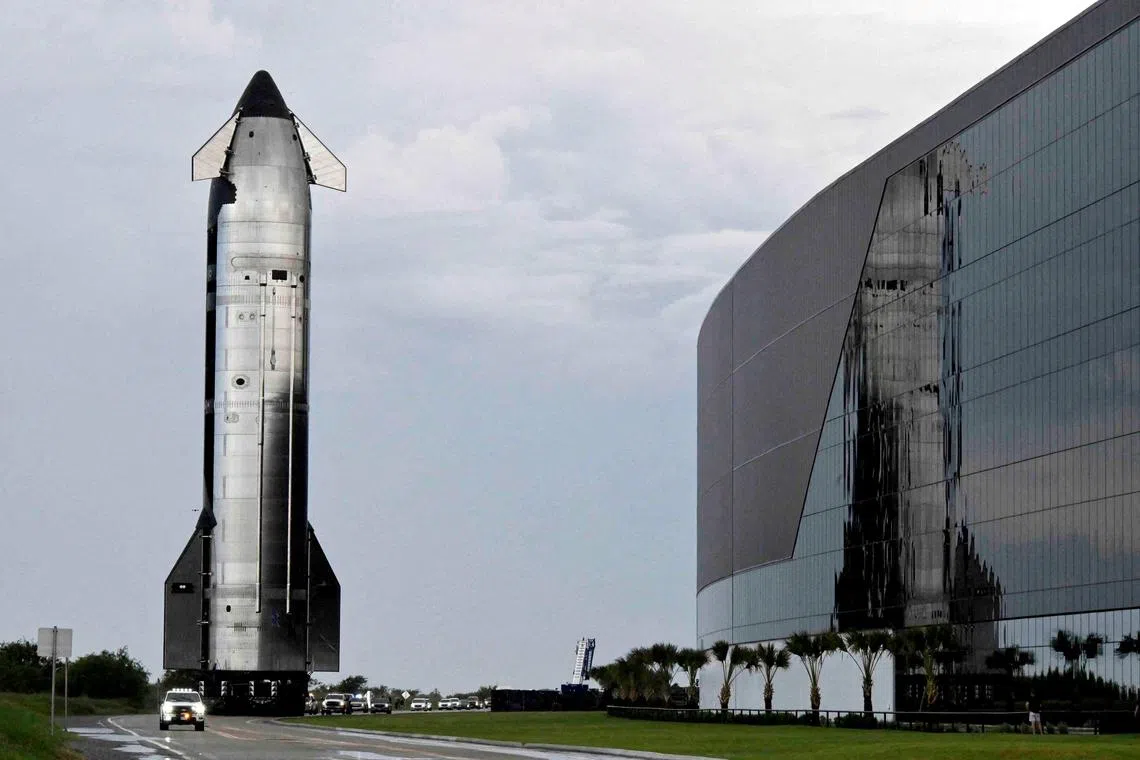SpaceX calls off Starship megarocket launch in latest setback
Sign up now: Get ST's newsletters delivered to your inbox

A countdown on the company’s website suggested there would be another attempt at the same time on the evening of Aug 25.
PHOTOS: REUTERS
SpaceX called off a planned test flight for its Starship megarocket on Aug 24, saying it needed time to troubleshoot problems, in the latest setback for Mr Elon Musk’s behemoth after a series of explosive failures.
The recent problems have led some observers to doubt whether the world’s biggest and most powerful launch vehicle will be capable of taking humans back to the Moon – or achieving Mr Musk’s dreams of colonising Mars.
The rocket had been scheduled to blast off on its 10th flight from the company’s Starbase in southern Texas at 6.30pm local time (7.30am Singapore time).
However around 15 minutes before lift-off, SpaceX scrubbed the flight, which is a relatively common event for space launches.
“Standing down from today’s 10th flight of Starship to allow time to troubleshoot an issue with ground systems,” it said on X, without elaborating.
SpaceX did not immediately announce a new launch date, but a countdown on the company’s website suggested there would be another attempt at the same time on the evening of Aug 25.
Road closures nearby Starbase indicated that Aug 25 and Aug 26 had been cleared for potential attempts.
The hour-long mission had been planned to put the rocket’s upper stage through a series of trials before the lower stage booster splashed down in the Indian Ocean.
An hour before lift-off was scrapped, Mr Musk posted on X that “Starship 10 launching tonight”. The normally prolific poster remained quiet on X after the postponement.
SpaceX had also earlier flagged a “technical update on Starship”, which did not appear to take place.
String of explosions
Starship is central to billionaire SpaceX founder Musk’s ambition of colonising Mars, while Nasa is counting on a modified version to return Americans to the Moon.
However the rocket’s upper stage – which is the spacecraft intended to carry crew and cargo – has exploded in all three previous test flights in 2025.
Two of the failed tests sent debris raining down over Caribbean islands, while the other reached space before breaking up. Then in June 2025, another upper stage exploded on the ground during a “static fire” test.
The 123m tall rocket is designed to eventually be fully reusable, but the company has not yet managed to get the upper stage to deliver a payload to space or return to the launch site.
After an investigation into the previous failed flight in May 2025, SpaceX said it would “intentionally stress the structural limits” of the upper stage, in the hopes of sounding out a successful return.
SpaceX has succeeded in catching the lower stage booster with giant “chopstick” launch tower arms three times, but the 10th flight will not attempt the feat.
The company’s “fail fast, learn fast” ethos has long been credited with its remarkable track record, giving the US company a commanding global lead in launches thanks to its Falcon rocket family.
But the Starship setbacks have raised doubts over whether the company can repeat that success with easily the biggest rocket in history.
Lot of pressure
Mr Dallas Kasaboski, a space analyst for consulting firm Analysys Mason, told AFP before the cancelled launch that the recent failures were beginning to take the sheen off SpaceX’s golden reputation.
“I think there is a lot of pressure on this mission,” he said. “We’ve had so many tests, and it hasn’t proven itself reliable – the successes have not exceeded the failures.”
Mr Will Lockett, a former engineer turned commentator went further, arguing on his Substack newsletter that the rocket’s failure to deliver a payload to orbit yet suggested “the concept of Starship is fundamentally flawed”.
The world’s richest man has staked the company’s future on Starship, planning to eventually retire its current generation of rockets and spacecraft in favour of the new system.
Even if the 10th test eventually succeeds, formidable technical hurdles remain – from making the system fully and rapidly reusable at low cost to proving it can refuel super-cooled propellant in orbit, a prerequisite for deep-space missions.
Still, SpaceX is pressing ahead, increasing the frequency of launches despite criticism from environmental groups over ecological impacts. AFP


